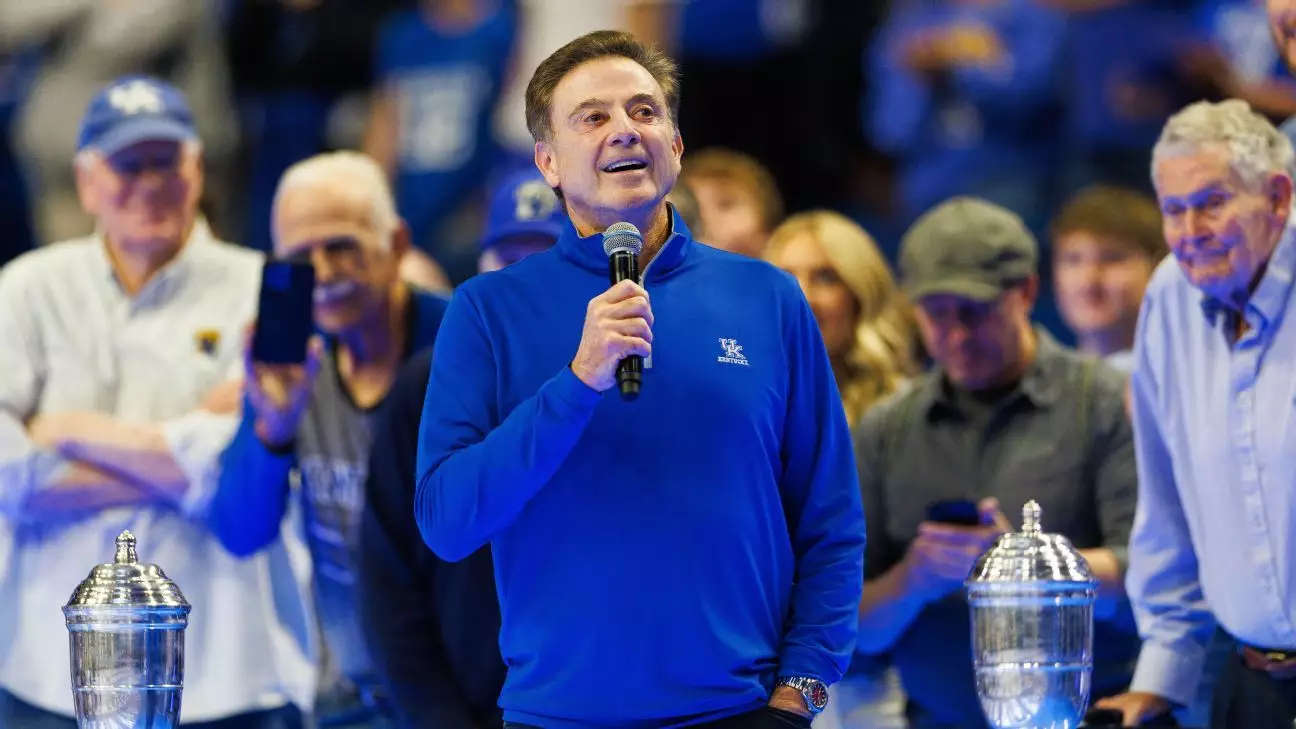Rick Pitino, a name synonymous with Kentucky basketball, made an emotional return to Rupp Arena this past Friday night, nearly 30 years after he guided the Wildcats to the pinnacle of college basketball—the national championship in 1996. The occasion was Kentucky’s Big Blue Madness, a highly anticipated event marking the start of a new season. Dressed in a Kentucky sweater, Pitino was welcomed back by a raucous crowd, a stark contrast to the reception he typically received as the head coach of their fierce rival, Louisville. This night was not just about nostalgia; it symbolized a significant reconciliation between Pitino and Kentucky fans, fostered by the hiring of Mark Pope, a former player capped by Pitino’s leadership in the ’96 title run.
Pitino’s journey has been tumultuous and complex. Getting into the profession as a promising young coach, he swiftly ascended the ranks at Kentucky. His departure for the Boston Celtics in 1997 was marked by a staggering 10-year, $70 million contract, a decision that forged bitter feelings among the fanbase. Following an up-and-down stint in the NBA, Pitino turned to Louisville in 2001, igniting a rivalry that heightened across the years. During his introductory press conference at Louisville, he expressed concerns regarding the reactions of Kentucky fans; his fears would indeed come to pass, as the rivalry intensified under his leadership and that of subsequent Kentucky coaches.
The rivalry, once steeped in healthy competition, turned acrimonious over the years, especially during the John Calipari era that began in 2009. Notably, Pitino infamously referred to the rivalry as “pure hatred” during the 2012 Final Four, showcasing just how fierce things had become. Flare-ups continued, culminating in a notorious incident in 2015 where he was accused of making an obscene gesture to the Rupp Arena crowd—an episode he vehemently denied.
Yet Friday night was not one of animosity. Instead, Pitino stood in front of a crowd he once perceived as adversarial, enveloped in warmth and enthusiasm. Overcome with emotion, he needed a moment before addressing the fans, stating, “I am so happy to be back.” His heartfelt expression echoed the sentiments of many present; it was a night to reflect on shared history and a community bound by love for the game. “This is one of the best nights I’ve had in a long time,” he continued, revealing his joy in reconnecting with former players and fans who supported him throughout an eight-year tenure filled with triumph.
The transformation of sentiment surrounding Pitino can largely be attributed to the recent events around the Kentucky program, particularly the hiring of Pope. As a captain of the national championship team, Pope embodied the spirit of Kentucky basketball that Pitino helped cultivate. This bond has fostered an atmosphere of goodwill and optimism, lightening the heavy air of past grievances. Pitino’s warm comments about Pope during the celebration highlighted the importance of continuity and legacy within Kentucky basketball. He emphasized Pope’s selflessness and dedication, proclaiming he will lead Kentucky back to greatness—a testament to the program’s potential and a sign of hope for both fans and players alike.
Pitino’s return last Friday evening was not merely a nostalgic trip down memory lane; it was a powerful reminder that basketball transcends rivalries and divisions. In an era where college athletics can frequently seem dominated by competition and discord, moments like these illuminate the power of shared experiences and mutual respect between former adversaries. As Pitino took in the cheers of a welcoming crowd, it became clear that the legacy he built at Kentucky had not faded—that it had merely evolved as the years progressed.
As he leaves behind a legacy interwoven with both triumph and rivalry, it’s evident that Pitino’s tale is one of resilience, commitment, and ultimately, redemption. The game continued, but so too did the spirit of unity among fans, athletes, and alumni. This remarkable return, filled with emotion and nostalgia, sets a precedent for future relationships in the landscape of college basketball and serves as a reminder that past conflicts can give way to renewed bonds—a pivotal lesson for fans, players, and coaches alike.


Leave a Reply